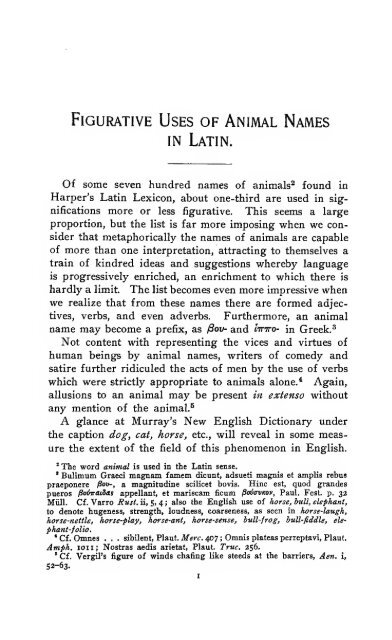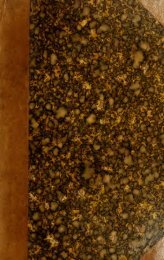Figurative uses of animal names in Latin and their ... - mura di tutti
Figurative uses of animal names in Latin and their ... - mura di tutti
Figurative uses of animal names in Latin and their ... - mura di tutti
You also want an ePaper? Increase the reach of your titles
YUMPU automatically turns print PDFs into web optimized ePapers that Google loves.
<strong>Figurative</strong> Uses <strong>of</strong> Animal Names<br />
IN Lat<strong>in</strong>.<br />
Of some seven hundred <strong>names</strong> <strong>of</strong> <strong>animal</strong>s* found <strong>in</strong><br />
Harper's Lat<strong>in</strong> Lexicon, about one-third are used <strong>in</strong> sig-<br />
nifications more or less figurative. This seems a large<br />
proportion, but the list is far more impos<strong>in</strong>g when we con-<br />
sider that metaphorically the <strong>names</strong> <strong>of</strong> <strong>animal</strong>s are capable<br />
<strong>of</strong> more than one <strong>in</strong>terpretation, attract<strong>in</strong>g to themselves a<br />
tra<strong>in</strong> <strong>of</strong> k<strong>in</strong>dred ideas <strong>and</strong> suggestions whereby language<br />
is progressively enriched, an enrichment to which there is<br />
hardly a limit. The list becomes even more impressive when<br />
we realize that from these <strong>names</strong> there are formed adjectives,<br />
verbs, <strong>and</strong> even adverbs. Furthermore, an <strong>animal</strong><br />
name may become a prefix, as ^ov- <strong>and</strong> l<strong>in</strong>ro- <strong>in</strong> Greek.^<br />
Not content with represent<strong>in</strong>g the vices <strong>and</strong> virtues <strong>of</strong><br />
human be<strong>in</strong>gs by <strong>animal</strong> <strong>names</strong>, writers <strong>of</strong> comedy <strong>and</strong><br />
satire further ri<strong>di</strong>culed the acts <strong>of</strong> men by the use <strong>of</strong> verbs<br />
which were strictly appropriate to <strong>animal</strong>s alone.* Aga<strong>in</strong>,<br />
allusions to an <strong>animal</strong> may be present <strong>in</strong> extenso without<br />
any mention <strong>of</strong> the <strong>animal</strong>.^<br />
A glance at Murray's New English Dictionary under<br />
the caption dog, cat, horse, etc., will reveal <strong>in</strong> some meas-<br />
ure the extent <strong>of</strong> the field <strong>of</strong> this phenomenon <strong>in</strong> English.<br />
" The word <strong>animal</strong> is used <strong>in</strong> the Lat<strong>in</strong> sense.<br />
' Bulimum Graeci magnam famem <strong>di</strong>cunt, adsueti magnis et amplis rebus<br />
praeponere (Sou-, a magnitud<strong>in</strong>e scilicet bovis. H<strong>in</strong>c est, quod gr<strong>and</strong>es<br />
pueros poimuSas appellant, et mariscam ficum ^oiavKov, Paul. Fest. p. 32<br />
Miill. Cf. Varro Rust, ii, 5, 4 ; also the English use <strong>of</strong> horse, bull, elephant,<br />
to denote hugeness, strength, loudness, coarseness, as seen <strong>in</strong> horse-laugh,<br />
horse-nettle, horse-play, horse-ant, horse-sense, bull-frog, bull-fiddle, elephant-folio.<br />
* Cf. Omnes . . . sibilent, Plant. Merc. 407 ; Omnis plateas perreptavi. Plant.<br />
Amph. loii; Nostras ae<strong>di</strong>s arietat, Plant. True. 256.<br />
" Cf. Vergil's figure <strong>of</strong> w<strong>in</strong>ds chaf<strong>in</strong>g like steeds at the barriers, Aen. i,<br />
52-63-



![Das Kriegswesen der Alten [microform] - mura di tutti](https://img.yumpu.com/21606999/1/167x260/das-kriegswesen-der-alten-microform-mura-di-tutti.jpg?quality=85)








